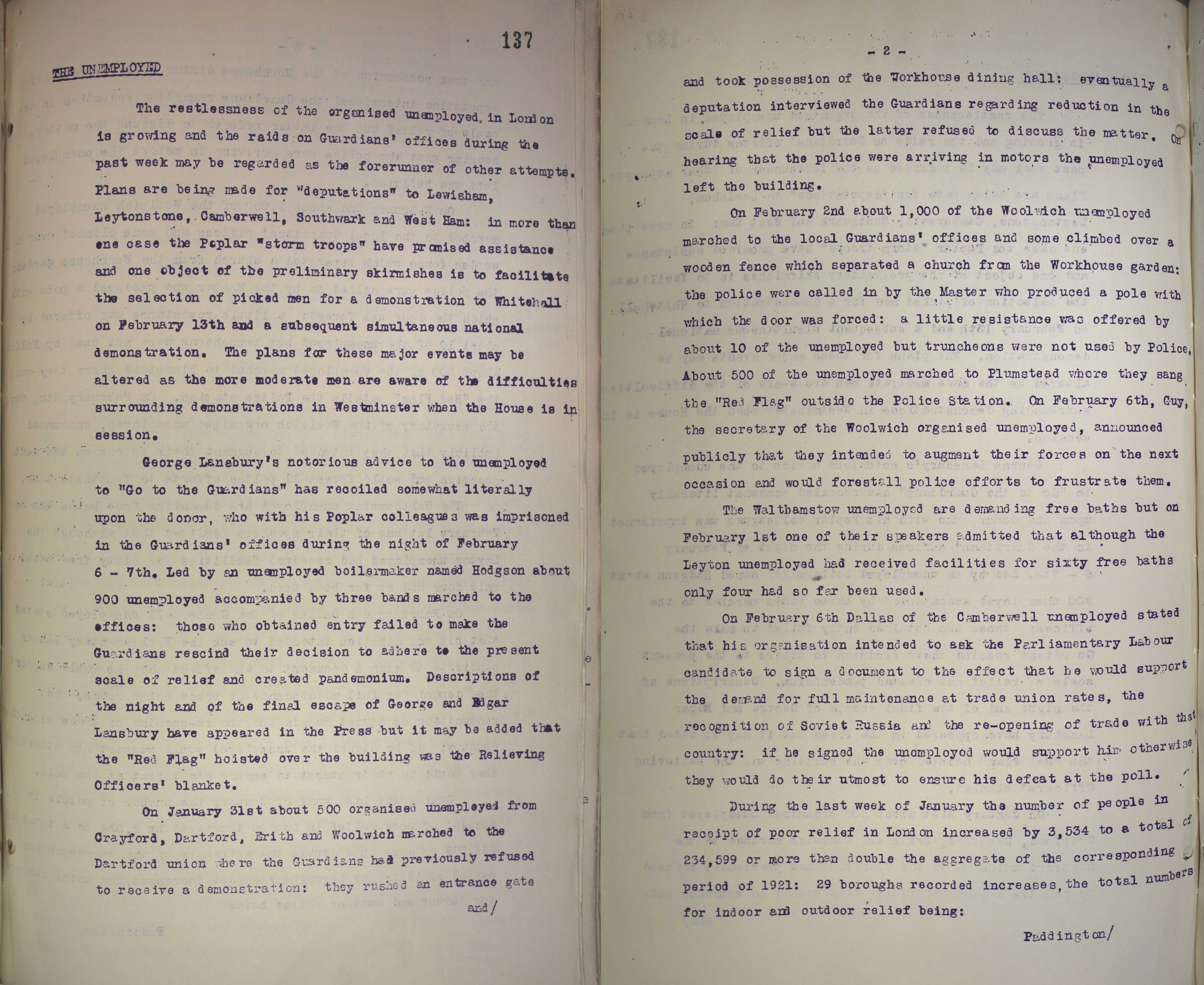
Extract from Cabinet memorandum on the activities of the unemployed, May 1925 (Catalogue ref: CAB 24/173)
Transcript
THE UNEMPLOYED
The restlessness of the organised unemployed, in London is growing and the raids on Guardians’ offices during the past week may be regarded as the forerunner of other attempts. Plans are being made for “deputations” to Lewisham, Leytonstone, Camberwell, Southwark and West Ham: in more than one case the Poplar “storm troops” have promised assistance and one object of the preliminary skirmishes is to facilitate the selection of picked men for a demonstration to Whitehall on February 13th and a subsequent simultaneous national demonstration. The plans for these major events may be altered as the more moderate men are aware of the difficulties surrounding demonstrations in Westminster when the House is in session.
George Lansbury’s notorious advice to the unemployed to “Go to the Guardians” has recoiled somewhat literally upon the donor, who with his Poplar colleagues was imprisoned in the Guardians’ offices during the night of February 6-7. Led by an unemployed boilermaker named Hodgson about 900 unemployed accompanied by three bands marched to the offices: those who obtained entry failed to make the Guardians rescind their decision to adhere to the present scale of relief and created pandemonium. Descriptions of the night and of the final escape of George and Edgar Lansbury have appeared in the Press but it may be added that the “Red Flag” hoisted over the building was the relieving Officer’s blanket.
On January 31st about 500 organised unemployed from Crayford, Dartford, Erith and Woolwich marched to the Dartford union where the Guardians had previously refused to receive a demonstration: they rushed an entrance gate
2
and took possession of the Workhouse dining hall: eventually a deputation interviewed the Guardians regarding reduction in the scale of relief but the latter refused to discuss the matter, hearing that the police were arriving in motors, the unemployed left the building.
On February 2nd about 1,000 of the Woolwich unemployed marched to the local Guardians’ offices and some climbed over a wooden fence which separated a church from the Workhouse garden: the police were called in the Master who produced a pole with which the door was forced: a little resistance was offered by about 10 of the unemployed but truncheons were not used by the Police. About 500 of the unemployed marched to Plumstead where they sang the “Red Flag” outside the Police Station. On February 6th, Guy, the secretary of the Woolwich organised unemployed, announced publicly that they intended to augment their forces on the next occasion and would forestall police efforts to frustrate them.
The Walthamstow unemployed are demanding free baths but on February 1st one of their speakers admitted that although the Leyton unemployed had received facilities for sixty free baths only four had so far been used.
On February 6th, Dallas of the Camberwell unemployed stated that his organisation intended to ask the Parliamentary Labour candidate to sign a document to the effect that he would support the demand for full maintenance at trade union rates, the recognition of Soviet Russia and the re-opening of trade with that country: if he signed, the unemployed would support him, otherwise they would do their utmost to ensure his defeat at the poll.
During the last week of January the number of people in receipt of poor relief in London increased by 3,534 to a total of 234,599 or more than double the aggregate of the corresponding period of 1921; 29 boroughs recorded increases, the total numbers for indoor and outdoor relief being…
